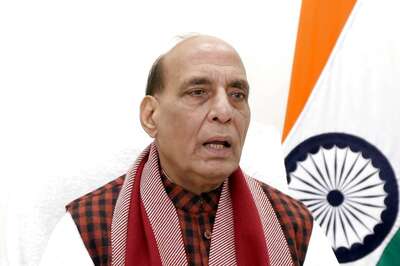
views
Washington: It can be hard to get people to face the truth sometimes. Especially about lying.
You don't want your kids to eat too much, so you say all the cookies are gone. You don't feel like going out, so you tell your date something important came up. You're overloaded with errands, so you call in sick.
Lies, all of them -- but we don't really like calling them that. In a new Associated Press-Ipsos poll, over half of respondents said lying was never justified. Yet in the same poll, up to two-thirds said it was OK to lie in certain situations, for instance, protecting someone's feelings.
Apparently white lies are an acceptable, even necessary, part of many lives even though we dislike the idea of lying.
25-year-old mother from Quincy, Illinois, Rebecca Campbell knew exactly what she was doing when she recently told her 4-year-old son that there were no more cartoons on TV. And she didn't like it.
"One day, he'll probably figure it out," she says. "There are cartoons on all the time," Rebecca adds.
"We couldn't have the TV on all day," Rebecca says. But, deep in her heart, she knew that telling him the truth would have been better, though more time-consuming, as discipline often is.
"It's the easy trap of a lie," she says ruefully. "It's easier than telling the truth," Rebecca adds.
That could be the reason why new haircuts receive so many compliments, notes Teresa Velin, a mother in Palm Desert, California.
Velin says it was just too darned hot and she didn't feel up to getting dressed and leaving home for a recent movie date. So she told a friend she was busy. "I'm not always as busy as I appear to be," says Velin. "But I don't want to ruin a friendship over a broken movie date," she adds.
Nearly two-thirds of Americans agree. In the AP-Ipsos poll, 65 per cent of those questioned said it was sometimes OK to lie to avoid hurting someone's feelings, even though 52 per cent said lying, overall, was never justified.
Among those 52 per cent, if he'd been alive and reachable, would have been the 18 century German philosopher Immanuel Kant, who believed all lying was bad, every single lie, even one that could save someone's life.
But most moral philosophers would disagree, assures noted ethics columnist Randy Cohen, who himself is so far from the Kantian view as to proudly proclaim. "I'm a big fan of lying," Cohen says.
"Not only is lying justified, it is sometimes a moral duty," he adds.
An obvious example is when you're lying to protect someone from serious harm. But much less extreme cases often call for lies, Cohen says.
An example he likes: Your fictional spouse, about to accept a Nobel prize, asks if they look fat. "If you're on the way to the award ceremony, you say, 'You look fabulous’." Cohen instructs.
"Anything else would be cruel." If you're still in the hotel room, a suggestion of a different outfit might be appropriate.
Still, every lie has its cost, Cohen says, and that's just another factor you need to consider. One key cost is credibility: Once a person finds out you lied, you lose currency in their eyes.
PAGE_BREAK
For 64-year-old Harold Smith, of Pioneer, California, it was worth the risk when he lied to his adult daughter about his health when undergoing treatment for a kidney tumor. "Why get her all traumatized?" says Smith. "I tried to protect her. It slowed down the anxiety. Later, I told her what really happened," he adds.
In the poll of 1,000 adults taken on June 23-27, four in 10 people said it was OK sometimes to exaggerate a story to make it more interesting, and about a third said it was OK to lie about your age.
In interviews, though, some specified that meant lying backward in time, not forward, as in trying to get past the drinking age.) The poll was taken on June 23-27 and had a margin of error of plus or minus three points.
A third also said it was OK to sometimes lie about being sick to take a day off work. Very few would admit to thinking it was OK to lie on a resume, cheat on taxes or lie to a spouse about an extramarital affair.
Among the groups more likely to say lying was sometimes OK: people aged 18-29, college graduates and those with higher household incomes. "People have this idea that lying is bad," says a visiting professor at UC Santa Barbara who's studied the phenomenon of lying, Bella DePaulo. "But when you really start going through it, it's not that simple," DePaulo adds.
In a study in the late '90s, DePaulo asked 77 college students and later, 70 people in the Charlottesville, Virginia, community to track every lie, however small, in a journal for a week. Of the 77 students, only one reported having told no lie. Of the 70 other people, six made that claim.
"People who say lying is wrong are often thinking in the abstract," DePaulo says. "In our real lives, we can't always pick honesty without compromising some other value that might be as important" -- like maintaining a happy relationship. If you're at a party and your partner is saying something you disagree with, for example, you might stay quiet, in the name of marital harmony.
Of course, there are inherent problems with any study that asks people to be honest about, well, being dishonest.
In the AP-Ipsos poll, for example, four in 10 people answered that they'd never had to lie or cheat. But one in 10 of those people said in the very next answer that yes, they might have told a lie in the past week.
Which means they might have misunderstood the question -- or, ahem, they may have lied.


















Comments
0 comment